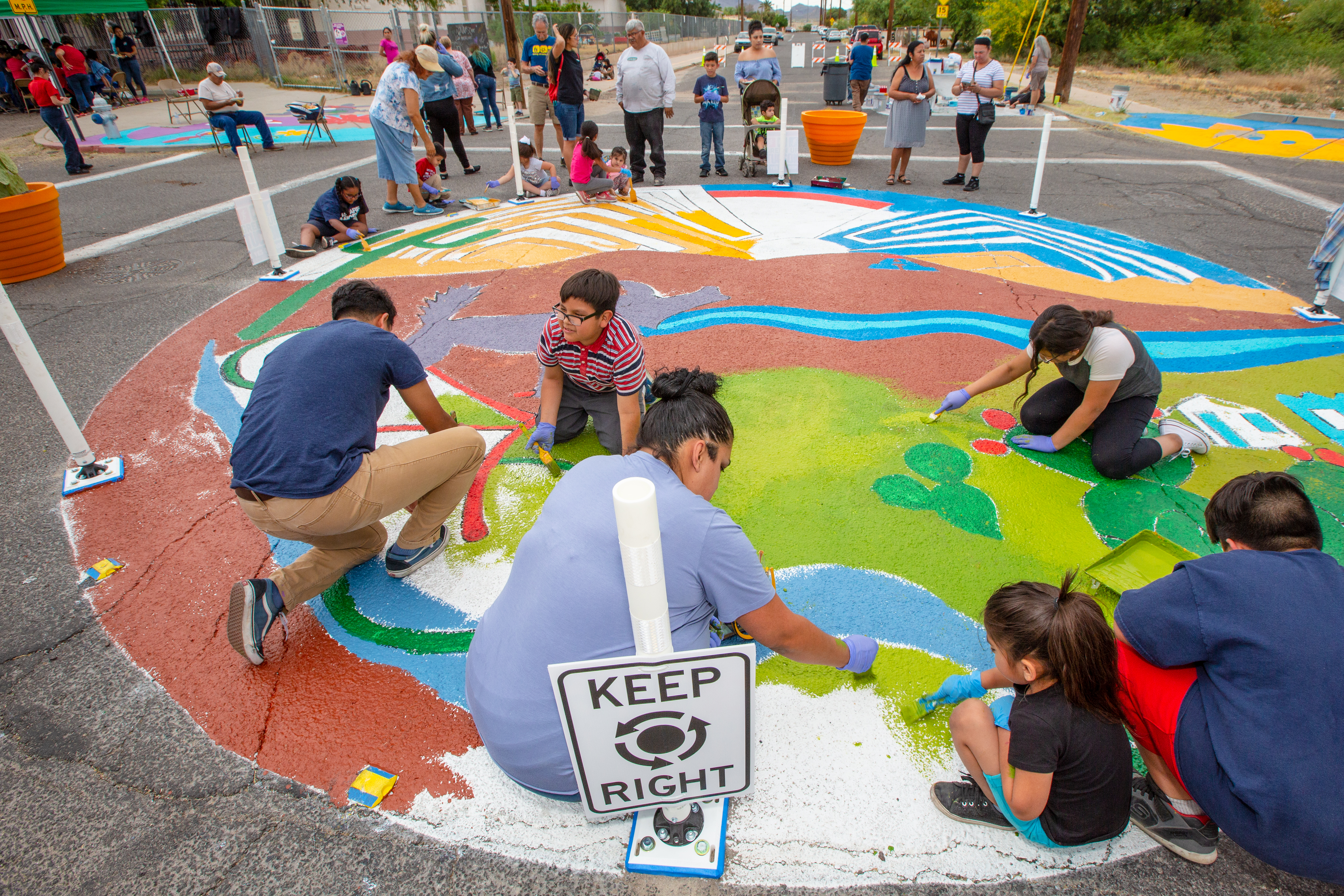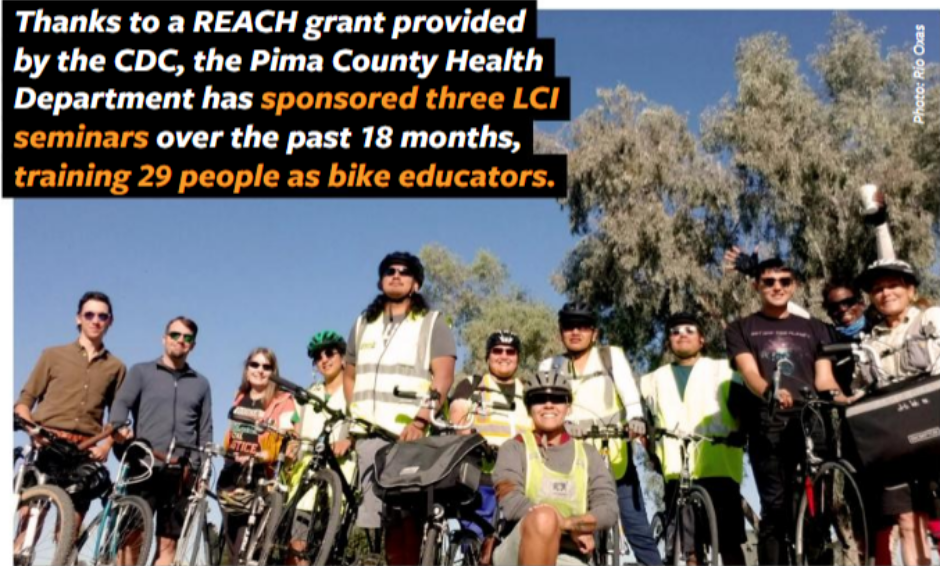DISCOVER YOUR LOCAL BICYCLING COMMUNITY
Find local advocacy groups, bike shops, instructors, clubs, classes and more!
The Story Behind a BFC: Tucson and Eastern Pima County Region, Arizona
Throughout years of learning the stories behind our Bicycle Friendly America participants, we have seen how partnership, in its purest form, can fuel any one business, university or community in its mission to be better for people who bike. In the case of Bicycle Friendly Community (BFC) Tucson and Eastern Pima County Region, Arizona, local partnerships help bridge the gap between those who know bikes best and those who would choose to bike if it were a safe, convenient and accessible option for all.
Tucson and Eastern Pima County Region first achieved BFC status in 2004 as a Silver-level awardee, then advanced to a Gold-level BFC in 2006, and last fall they renewed that honor in our latest round of BFC awards. In their continued efforts to build a better, more bikeable community, the City of Tucson and the City of South Tucson have emphasized removing barriers to bicycling and promoting its many public health benefits. Community partners like the Living Streets Alliance (LSA) and the Pima County Health Department (PCHD) have helped tremendously in mobilizing and educating cyclists across the region while advocating for “all ages and abilities” infrastructure.
Making Streets Safer for All
Check out the League’s Bike Equity Index Report on our website.
Establishing bicycling as a safe, convenient and accessible option for all relies on planning and implementing safe bike infrastructure and road design. In response to systemic racism and historical under-investment in some parts of the city, the City of Tucson developed an equity analysis as part of their Move Tucson planning process to help identify areas of the community with greater barriers to transportation and mobility, guide project development and outreach efforts unique to those areas, and prioritize project and program funding in the most vulnerable parts of the community.
 |
|
Traffic circle painting at Mission View Block Party Photo Credit: Creatista |
Local bike advocates have also had a role to play in creating safer, more equitable, and more accessible streets. Living Streets Alliance, a nonprofit and a Silver-level Bicycle Friendly Business, lives out its mission “to advocate for a thriving Tucson by creating great streets for all of us” through initiatives like Reclaim Las Calles and Cyclovia Tucson. Reclaim Las Calles engaged the South Tucson community to reclaim a key neighborhood street as a public, social space by hosting block-painting parties where community members joined bike rodeos, enjoyed food and music, and painted city traffic circles to make the space safer and more inviting to those traveling by foot and bike. The initiative was the culmination of partnerships with John Valenzuela Youth Center, Ochoa Community School, and Mission View Elementary, with support from a local health organization, Vitalyst Health Foundation.
LSA also hosts Cyclovia Tucson, a biennial “open streets” day that attracts approximately 40,000 participants a year. The event offers free bike repairs, helmets and fun-filled activity hubs, but most of all, it provides a chance for residents to experience the benefits of exploring the community through car-free travel.
In response to the Covid-19 pandemic, the City of Tucson implemented a series of 15 Slow Street Projects in neighborhoods throughout the city using temporary materials to redirect and slow motor vehicle traffic on select residential streets to provide better opportunities for biking and walking. The street segments were selected based on indicators of transportation-vulnerable communities (low-income, people with disabilities, communities of color, lack of access to motor vehicles, etc.) and areas more heavily impacted by Covid-19.
The City of Tucson is now working to make those temporary installations permanent with an ongoing Slow Streets program and, following the cancellation of Cyclovia back in March 2020, LSA began implementing a similar Shared Streets Program in the City of South Tucson.
On behalf of the City of Tucson and the City of South Tucson, LSA also coordinates the Safe Routes to School Tucson program aimed at making it safer and easier for youth and families to walk and bike to school. The program focuses its efforts on four schools annually in underrepresented areas facilitating activities tailored to each school like safe route mapping, after-school bike clubs and weekly “Walk & Roll” events. Additionally, in-school bike education classes are offered in 125-150 third-grade classrooms each year across Pima County.
Bicycle Education for All
 |
| The new Pima County LCIs photographed in our Fall 2020 American Bicyclist Magazine |
In 2019, Tucson’s bicycle education efforts received a big boost thanks to the Pima County Health Department and the CDC’s REACH (Racial and Ethnic Approaches to Community Health) grant program. The grant allowed PCHD to sponsor League Cycling Instructor (LCI) seminars for PCHD and REACH staff; middle and high school teachers; Pima County workforce development staff transitioning people from incarceration; and health educators and ride leaders from regional Native American tribes.
“Three LCI training seminars offered in April of 2019 through March of 2020 resulted in 29 new LCIs,” said Eric Post, member of the Tucson-Pima County Bicycle Advisory Committee. “By increasing the diversity of LCIs, community partners are taking the lead in teaching bike safety in their own communities. Several of the new LCIs have been hired as bike ambassadors to teach in the middle school bike program in their own community.”
We featured the new Pima County LCIs in the Fall 2020 issue of American Bicyclist. Read more here.
Community members who are not ready or unable to take an official bike safety course are still able to access the information they need to get riding through Bike Buddy, a one-on-one coaching program for youth and adults wanting to learn to ride. In addition, the PCHD staff worked with new League Cycling Instructors at the Tucson Indian Center (TIC) to offer two online classroom sessions of the League’s Traffic Skills 101 class for adults. TIC plans to continue offering the online option to make bike safety education more accessible to participants in remote areas.
The Pima County Health Department’s Bike and Pedestrian Program also includes bike education in elementary and middle school. The elementary school program is held in two sessions: a classroom bike safety game and discussion followed by an outdoor bike rodeo. This program reaches approximately 2,500 students from 25 schools in Pima County.
The PCHD middle school program is a 5-week (10 session) curriculum that includes both on-campus and off-campus group riding skills, including on the Chuck Huckelberry Loop. PCHD also provides a fleet of 20-24 bikes to each of the six-seven schools throughout the Pima County region and LCIs (some of whom are teachers at the school) use them to carry out the bike safety instruction for classes offered during and after school.
Promoting Bikes to All
To decrease language barriers, all City of Tucson public outreach materials and virtual meetings are conducted in both English and Spanish. In areas where the monolingual Spanish-speaking population is greater than 10%, the city provides Spanish-only meeting opportunities.
Tucson Indian Center promotes its bike safety classes through community listserves and social media, which reaches members in every Native American tribe in the region. Tucson’s Pedaling the Pueblo brings listeners the latest news on bicycling culture in the greater Tucson area and updates on the efforts of bicycle advocates across the community through a podcast hosted by the community radio station KXCI. Pedaling the Pueblo was created by Living Streets Alliance and underwritten by the City of Tucson.
The Chuck Huckelberry Loop, the region’s 136-mile shared-use pathway, has been improved since Tucson’s last BFC application with connections to urban routes, bikeways, and bike boulevards. A video PSA titled “The Loop is for Everyone” was produced featuring recent LCI graduates and a local runner, to advocate for bike/ped safety on the Loop and emphasizes slowing down, passing with care and practicing social distancing.
The City of Tucson has also been experimenting with non-traditional forms of public outreach and engagement in an effort to reach people who face more barriers to participation through traditional means such as virtual meetings, public open houses, etc. Non-traditional methods include free bike repair events; bike-in movies at the park; free ice-cream socials; community walks and bike rides; door-to-door canvassing; tabling at grocery stores, libraries, farmer’s markets, and “piggy-backing” on other popular community events.
Sign up here to be notified when the BFC application reopens for submissions.
If you’d like to learn more about how you can improve bicycling in your community or how to become a Bicycle Friendly Community, visit bikeleague.org/community. The BFC form is currently offline for updates through Spring 2022, but you can find steps you can take now to strengthen your next BFC application here.